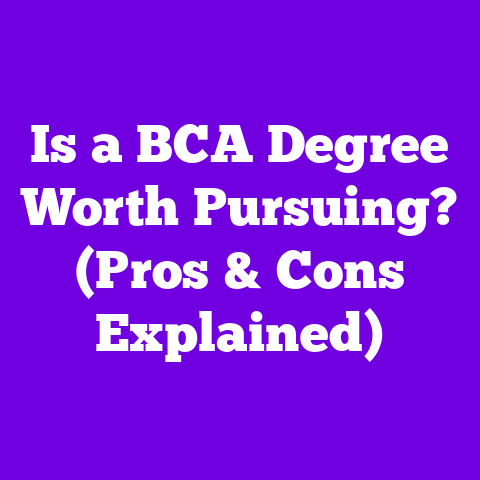Is a Graduate Degree in Economics Worth It? (In-Depth Guide)
Deciding whether to pursue a graduate degree is an important life decision that requires careful consideration of the costs and benefits.
A graduate degree in economics can open doors to lucrative careers, but also requires a significant investment of time and money.
An advanced degree in economics provides specialized knowledge to analyze complex economic data and trends.
It equips you with quantitative abilities and an understanding of economic theory to evaluate fiscal and monetary policies, trading patterns, risk assessments, and more.
Economics graduates are employed in diverse fields like finance, business, government, research organizations, and more.
Careful career planning can lead to rewarding jobs with high compensation.
However, graduate school also demands a major commitment of time and money which can limit options.
This guide examines all factors to consider before deciding if an economics graduate degree offers a high return on investment and aligns with your professional aspirations.
Career Options and Salary Potential
A major consideration is whether an economics graduate degree will open up well-paid, interesting career opportunities suited to your goals.Economics majors can qualify for a variety of analytical and leadership roles with strong earning potential.
Common positions include:
Financial Analyst
Financial analysts assess economic trends to advise organizations on profitable investments and strategy. They are employed within investment banks, insurance agencies, corporations, etc. The median salary for financial analysts is over $85,000.
Data Analyst
Data analysts use statistical models to interpret complex information and identify economic insights to guide business strategy.
This fast-growing, lucrative field has a median salary around $63,000.
Actuary
Actuaries analyze financial risk and uncertainty.
They evaluate the likelihood of events and future scenarios to design insurance policies, pension plans, and other financial strategies.
Actuary positions offer six-figure earning potential in the range of $111,000.
Economics Professor
Academia offers an intellectually stimulating career for Ph.D. economists. Professors develop economic models, teach university students, and conduct research. The average salary for economics professors exceeds $117,000.
Government Policy Analyst
Economists are hired to perform data analysis and make policy recommendations for government agencies like the Treasury Department, Federal Reserve, Department of Commerce, CIA, etc.
Compensation varies by agency but often exceeds $100,000.
The earning potential for economics graduates is clearly well above average compared to other fields.
Salary should not be the only consideration but is an important factor in determining return on investment for higher education.
Program Costs
Pursuing an advanced economics degree requires a substantial financial investment that impacts affordability.
Tuition and fees vary significantly by program, public or private university status, and whether pursuing a Master’s vs Ph.D.
On average, tuition for an economics Master’s program ranges from $30,000-$75,000 total. Doctorate programs cost between $60,000-$150,000 plus lost income during 4-6 years of study.
Textbooks, university fees, and living expenses also add to costs – from $20,000-30,000 for a Master’s up to $80,000+ for a Ph.D.
Total investment for an economics graduate degree can easily exceed $100,000.
However, over half of Ph.D.
students and one-third of Master’s students receive teaching or research assistantships covering tuition and providing a modest living stipend.
Competitive student aid packages make the advanced degrees more affordable.
Student loan debt is also a reality for many graduates.
Carefully calculating total costs and exploring funding options are vital steps when evaluating program options.
Program Duration
The length of time out of the workforce is another cost through lost earnings.
A Master’s degree usually takes 1-2 years to complete full time. The coursework focuses on advanced economic theory, research methods, statistics, and econometrics. Some programs require a thesis paper.
Doctoral programs take 4-6 years on average. Ph.D. students undergo rigorous academic training in economic research and analysis. Dissertating and defending a thesis paper is required to graduate.
Part-time options allow working professionals to continue their income stream but lengthen the timeline to degree completion.
Consider both the actual program length and time out of your career field when weighing lost income costs against potential salary gains post-graduation.
Career Advancement Potential
Income statistics provide helpful data but may not capture the full career impact of an economics degree.
Economics knowledge is extremely valuable within both public and private institutions. Quantitatively trained economists rise to senior positions guiding strategy and policy decisions. An advanced degree demonstrates specialized expertise that distinguishes your candidacy.
While career progression is possible without a higher degree, the additional credentials provide leverage and advantages for climbing the ranks faster.
Weigh your personal career goals before deciding on the necessity of graduate education.
Alternatives to Graduate School
Before committing to an intensive economics program, also consider alternative routes to your goals.
Could you gain valued real-world experience through internships or entry-level jobs? Does your employer offer tuition reimbursement or in-house training to build skills?
Thoroughly research industry requirements and typical career timelines in your desired field. In some cases hands-on experience may suffice without graduate academics. Economics knowledge can also be developed through free online coursework.
However, a graduate degree remains the standard path to become an economist or economic consultant.
Formal education signals analytical competencies and trains you to apply economic theories.
Key Deciding Factors
Determining the payoff of an economics graduate degree comes down to aligning with your career ambitions and evaluating the costs.
Those passionate about economics itself will gain immense value from the intellectual stimulation of advanced academics, research, and expanding perspective of the field’s great minds.
Pragmatically weighing salary outcomes against educational costs also impacts program decisions.
An economics degree can offer strong financial returns but varies individually by funding availability, career goals, and program length.
Carefully consider these key factors when deciding if graduate study in economics is your ticket to advancement or an unnecessary detour:
- Career Goals: Will an economics degree qualify you for specific positions unattainable otherwise?
- Salary Boost: Does potential income growth offset costs of education?
- Subject Interest: Are you genuinely excited to immerse yourself in high-level economics?
- Existing Opportunities: Could you progress without extra schooling?
- Time Investment: Can you afford 2-6 years out of workforce and lost income?
- Financial Costs: How will you fund tuition and living expenses?
- School Reputation: Will the program and network elevate your credentials?
Analyze how each element applies to your personal situation and professional objectives.
Project future scenarios with or without graduate education in economics to decide if the demanding commitment ultimately pays dividends.
Frequently Asked Questions
Still undecided if an economics degree offers a worthwhile ROI? These common questions can help finalize your verdict:
Is it better to get a Master’s or Ph.D. in economics?
- Master’s Degree – Offers versatile advanced training for business and data analysis careers.
Typically takes 1-2 years and costs $30,000-$75,000.
Results in over $85,000 average salary. - Ph.D. Degree – Specializes training for academic and government economist roles. Requires 4-6 year commitment and $60,000-$150,000 costs. Graduates earn $117,000+ salaries.
Choose based on desired career path and affordability. A Master’s provides excellent ROI for many while a Ph.D. is required for university teaching and advanced research.
What entry-level jobs can I get with an economics degree?
Common starter roles for economics graduates include financial/data analyst, research assistant, actuarial analyst, consulting associate, and statistician.
Economics knowledge also applies well to business operations, compliance, and sales related openings.
Is economics a good Master’s degree?
Yes, an economics Master’s degree provides advanced analytical and data skills that lead to lucrative roles in business, finance, government, and more.
Graduates earn over $85,000 median salary while tuition costs under $75,000.
Should I get a Ph.D. in economics?
Pursue a Ph.D.
in economics if your goal is to teach at universities, direct economic research at think tanks/government agencies, or become an expert consultant.
Weigh the 4-6 year timeline and costs over $100,000 against need for specialized high-level training.
How much more do economists make with a Ph.D.?
Economics professors with Ph.D.s earn over 40% higher salaries than those with only Master’s degrees.
Overall average wages are $117,000 with a doctorate compared to $83,000 with a Master’s according to the Bureau of Labor Statistics.
Is economics a good major for law school?
Yes, economics complements legal studies well by training logical thinking and data analysis skills. Understanding economic forces, public policy, financial markets, costs vs. benefits also provides helpful context for law.
Pursuing an advanced economics degree equips you with a versatile, valuable skillset but requires careful evaluation of costs against expected career return on investment.
Assess your professional goals, affordability factors, and commitment readiness when deciding if further economics education is worthwhile.
Utilize the guidance throughout this article to determine if a graduate degree in economics will pay dividends towards your aspirations.






